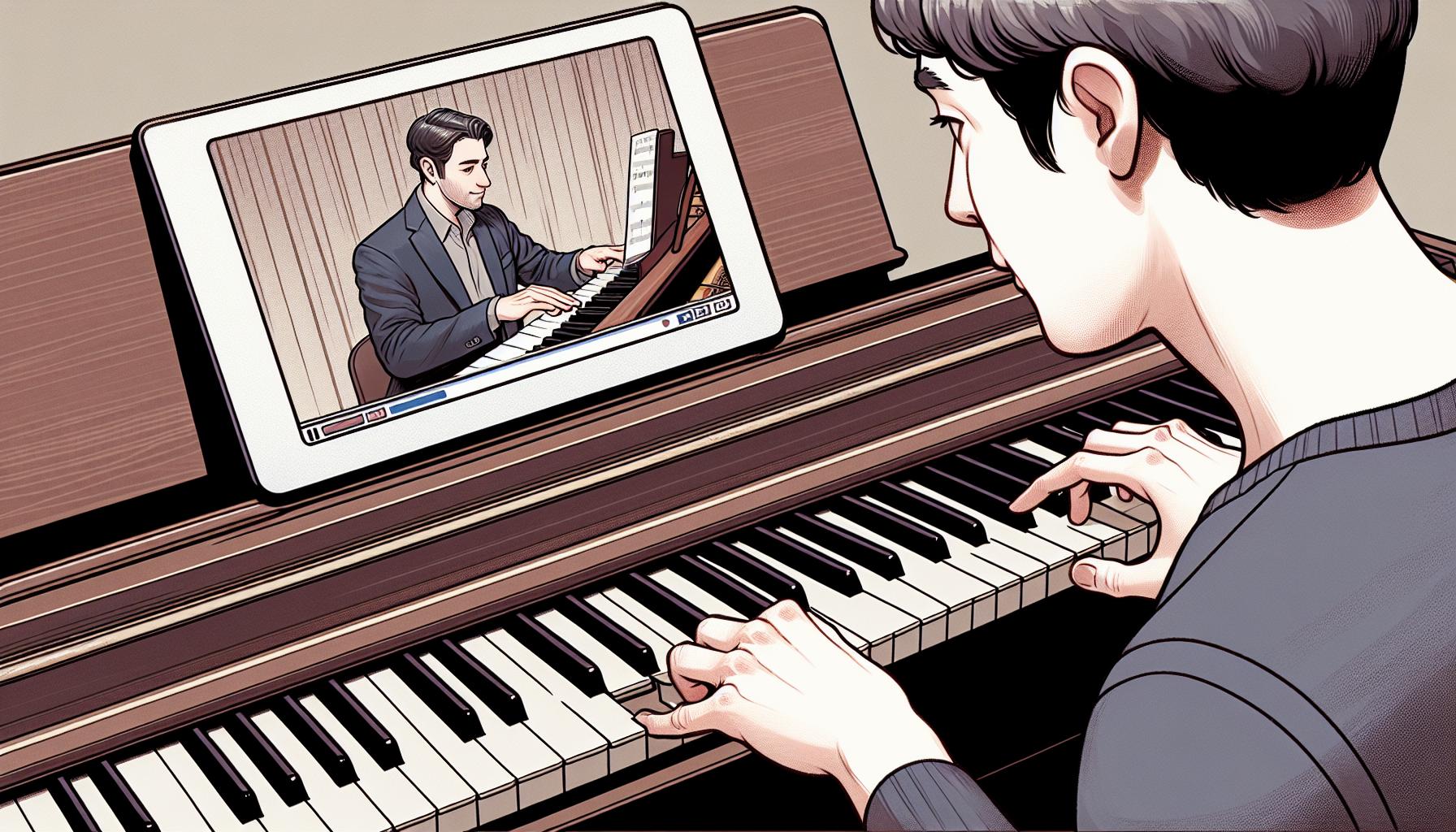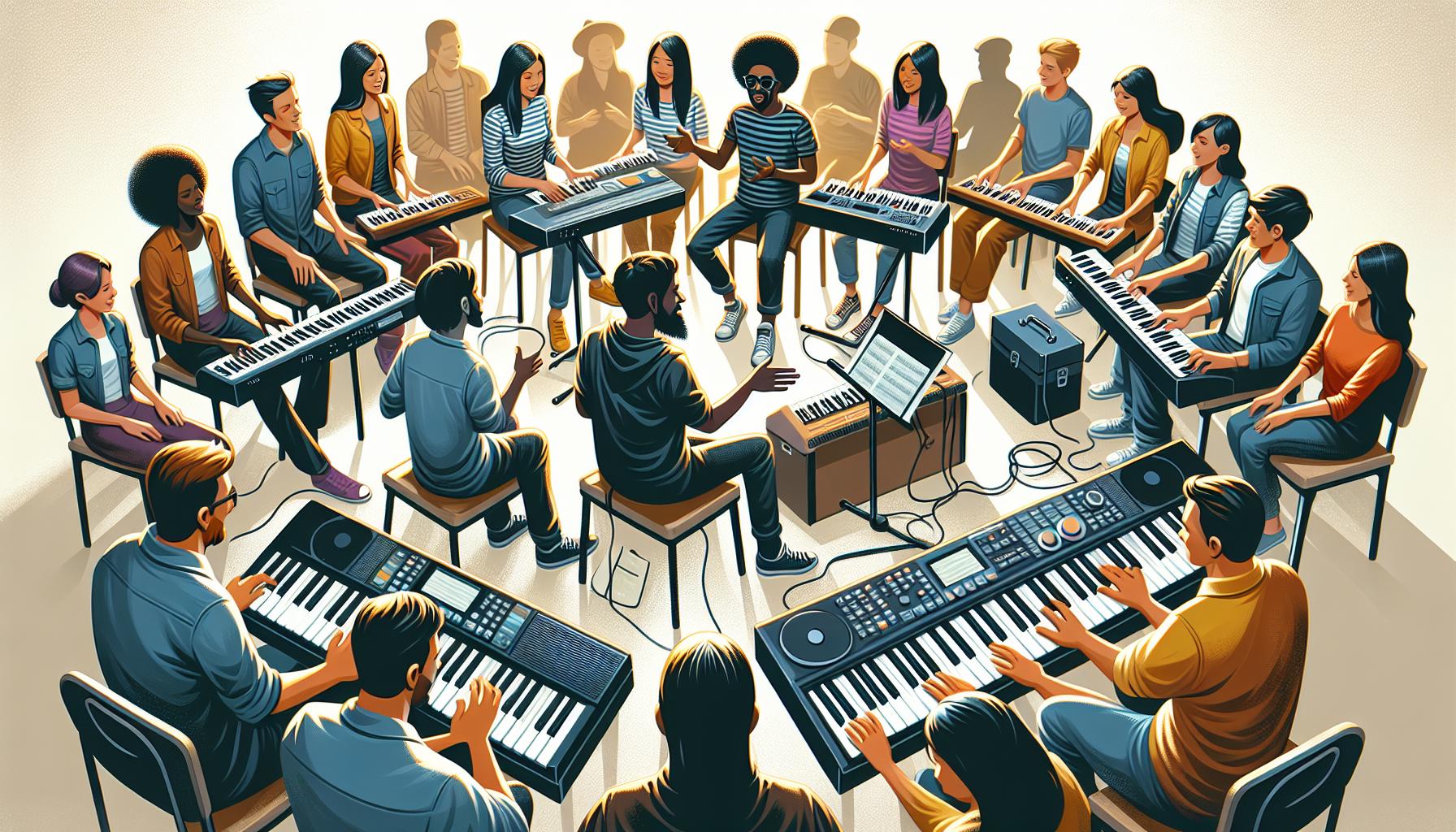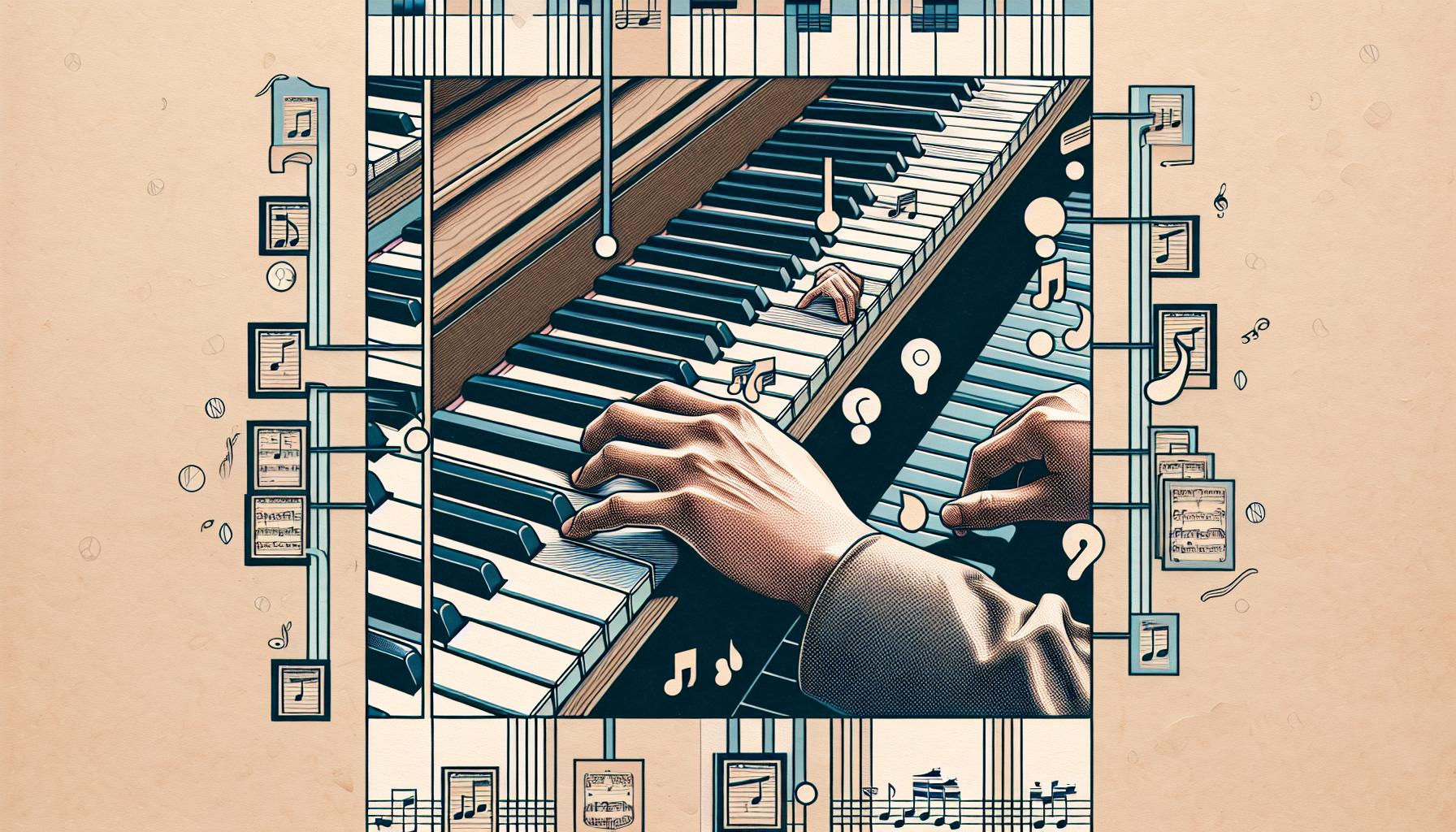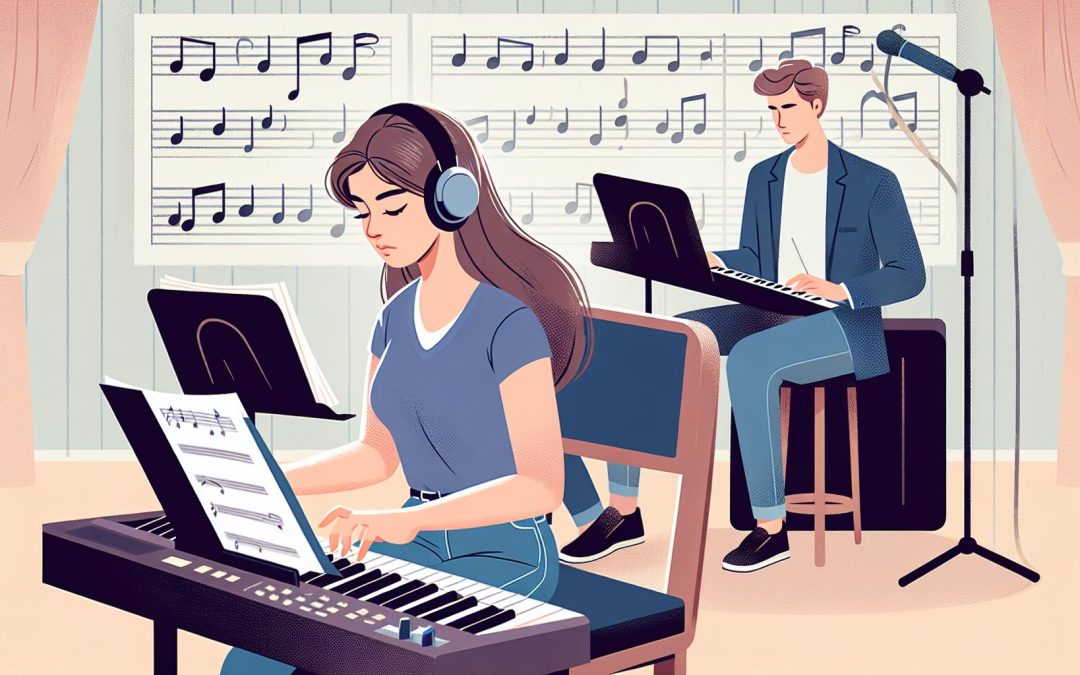Learning to play the keyboard can be an exciting journey, but it's no secret that staying motivated through the ups and downs requires a bit of strategy. Whether you're mastering a new song or tackling challenging chords, the thrill of progress is what keeps the fire burning. Yet, there are moments when motivation starts to wane, and that's perfectly normal.
The key to staying motivated lies in understanding that every great keyboardist started somewhere, and the journey is as rewarding as the destination. This article will explore practical tips and tricks to keep your spirits high and your fingers moving. From setting achievable goals to finding a community of fellow learners, we'll dive into how to maintain your enthusiasm for the keyboard, ensuring that every practice session is as enjoyable as the first.
Setting Achievable Goals
When diving into learning the keyboard, one of the most effective strategies to maintain motivation is setting achievable goals. Goals act as beacons of light on a learner's journey, providing direction and a sense of purpose. However, the key is to set goals that are challenging yet attainable within a reasonable timeframe.
Short-term goals are vital for keeping daily motivation high. These could include learning a new chord each day, practicing scales for 15 minutes, or mastering a simple song by the end of the week. The satisfaction of ticking off these smaller objectives provides immediate gratification and fuels the desire to tackle the next challenge.
On the other hand, long-term goals offer a bigger-picture perspective and can include aims such as completing a keyboard course in six months, participating in a local music event, or even composing an original piece. These ambitions help learners to visualize their future selves as accomplished keyboardists, driving them forward during moments of doubt or frustration.
It's also beneficial to break these goals down into actionable steps. For instance, if the aim is to master a particularly complex piece of music, the learner could:
- Divide the piece into sections
- Focus on one section per practice session
- Slowly piece sections together as each is mastered
- Practice transitions between sections to ensure smoothness
This methodical approach reduces overwhelm and makes the goal seem more attainable.
To ensure these goals truly motivate, they should be:
- Specific: Clearly define what success looks like.
- Measurable: Include criteria that make it easy to track progress.
- Achievable: Be realistic given current skills and available time.
- Relevant: Align with the overall purpose, such as becoming a proficient keyboard player.
- Time-bound: Have a deadline to keep the momentum going.
Incorporating rewards for achieving milestones can also significantly boost motivation. Perhaps it's treating oneself to a new piece of music or a related gift after mastering a difficult song. These rewards act as an extra incentive to push through challenging periods.
Lastly, keeping a progress journal can be incredibly motivating. Documenting achievements, no matter how small, serves as a tangible reminder of how far one has come. It’s easy to forget past accomplishments when faced with new challenges, but reviewing a progress journal can reignite determination and pride in one's journey.
Finding Inspiration from Great Keyboardists

One of the most exhilarating ways to stay motivated while learning the keyboard is by drawing inspiration from great keyboardists. Watching and listening to accomplished pianists and keyboard players can ignite a desire to achieve similar proficiency. It's about seeing what's possible and envisioning oneself reaching those heights. From classical maestros like Ludwig van Beethoven and Sergei Rachmaninoff to modern-day virtuosos like Jordan Rudess from Dream Theater and Cory Henry, the range of styles and expressions is vast and varied.
Many successful keyboard players often share their journeys, highlighting the struggles and milestones they encountered along the way. This can be incredibly reassuring for beginners, who may often feel overwhelmed by the challenges they face. They see that even the greats had to start somewhere, and that persistence and passion are key to overcoming obstacles.
Social media platforms and video-sharing websites are treasure troves of performances, tutorials, and interviews from these talented individuals. Beginners can:
- Watch live performances to understand the energy and emotion that music can convey.
- Follow tutorial videos specifically designed by these artists to help novices grasp basic and advanced keyboard techniques.
- Listen to interviews to learn about the artists' philosophies on music, practice routines, and how they deal with setbacks.
Emerging keyboard players should not hesitate to explore different genres. Diversity in musical exposure broadens understanding, influences one's style, and prevents monotony from setting in. A classical enthusiast might find unexpected inspiration in jazz improvisations, while a rock keyboardist could discover new complexity in classical compositions. This cross-genre exploration can unlock creative potential and deepen an appreciation for the keyboard's versatility.
Participating in online forums and communities focused on keyboard playing also offers a platform to discuss these inspirations and learn from peers who share similar musical interests. Engaging with others can bring new insights, recommend unknown artists for inspiration, and even foster collaborations that enrich the learning experience.
Setting aside time for focused listening and analysis is crucial. When learners dissect a piece played by a great keyboardist, noting the techniques used, the emotional conveyance, and the composition's structure, they gain a deeper understanding of the artistry involved. This critical listening can be a powerful learning tool, encouraging them to integrate similar elements into their playing.
Joining a Community of Learners

Learning the keyboard is a journey that thrives on motivation, inspiration, and, importantly, a sense of community. For beginners and even those further along in their journey, finding a group of like-minded individuals can be transformative. Communities offer support, advice, and the unique opportunity to share progress, struggles, and achievements. They serve as an invaluable resource for novices and experienced players alike, providing a platform for interaction and growth.
Online forums and social media groups have become bustling hubs for keyboard learners. Platforms like Reddit, Facebook, and even Discord host vibrant communities where members can post questions, share their music, and provide feedback to others. These digital spaces allow learners to connect with peers from around the globe, offering diverse perspectives and insights that might not be available locally.
Participating in these communities can also lead to finding mentors or accountability partners. Having someone to share goals and progress with can significantly boost a learner's motivation and discipline. It’s the shared experiences, the tips for overcoming common challenges, and the celebration of every small victory that knit these individuals together, fostering a motivating environment that propels each member forward.
Local music clubs and keyboard classes offer another dimension to joining a community of learners. These spaces provide the physical presence and direct interaction that online forums cannot. Being part of a local group where members meet regularly for jam sessions, workshops, or just casual play can enrich the learning experience. Such interactions are not only beneficial for improving skills but also for building lasting friendships rooted in a shared passion for music.
Engaging in competitions or group performances can also be an exhilarating way to stay motivated. These events introduce a healthy sense of competition and provide goals for learners to work towards. Additionally, they offer the chance to witness the vast range of creativity and skill among peers, which can be incredibly inspiring.
Whether it’s online or in person, becoming part of a community comes with numerous benefits:
- Motivation and Encouragement: Continuous support and encouragement from peers help keep motivation high.
- Diverse Learning Resources: Access to a wide array of tips, tutorials, and experiences shared by community members.
- Feedback and Collaboration: Opportunities for constructive feedback and collaboration on projects or learning exercises.
- Networking: Connections made can lead to potential collaborations, mentorship, and even friendships that go beyond just learning the keyboard.
Rewarding Yourself for Milestones

When embarking on the journey of learning the keyboard, setting and achieving milestones isn’t just a matter of progress; it's also about recognizing and celebrating each step forward. The practice of rewarding oneself for hitting specific goals can significantly boost motivation and sustain interest in the learning process. This doesn’t need to involve grand gestures. Often, small, meaningful rewards can provide the encouragement needed to keep moving forward.
For beginners, the milestones could be as simple as mastering a new chord, playing a piece without mistakes, or practicing consistently for a whole week. For each of these achievements, selecting a personal reward that feels special or indulgent can create a positive association with the effort put into learning. Some people might treat themselves to a new piece of music, a keyboard accessory, or even a relaxing day off from practice. The key is choosing something that genuinely feels rewarding and motivates further practice.
Here's a simple breakdown of potential milestones and matching rewards:
| Milestone Achieved | Potential Reward |
|---|---|
| Mastering a new chord | Downloading a new piece of sheet music |
| Playing a piece flawlessly | A new keyboard accessory |
| Consistent daily practice for a week | A day off or a special treat |
| Learning a song by heart | Sharing the performance with friends or online |
Engaging with online communities or local music groups can also offer a platform to share achievements and receive encouragement and praise from fellow learners. This social reinforcement serves as an additional reward, amplifying the sense of accomplishment and belonging within a community of keyboards enthusiasts.
Moreover, setting progressively challenging milestones can ensure continuous learning and improvement. As one's skills grow, the milestones should reflect this progression, maybe moving from learning basic chords to mastering complicated pieces or even composing original music. Adjusting rewards to keep pace with advancing milestones ensures that motivation remains high.
Encouraging continuous feedback during this journey, whether from a teacher, online forums, or self-assessment, provides clarity on progress and insights into what the next set of milestones could include. This feedback loop not only helps in adjusting goals and rewards to match one’s current skill level but also in recognizing when to celebrate progress.
Embracing the Journey

Learning to play the keyboard is more than just hitting the right notes; it's about enjoying and embracing the journey, from the confusing first steps to mastering complex compositions. Along the way, challenges and setbacks are inevitable, but they're also a crucial part of the learning process. They offer invaluable lessons that go beyond music theory and practice.
One effective strategy for staying motivated is to break down the learning process into smaller, manageable chunks. Instead of viewing the journey as a daunting path to becoming an accomplished musician, learners should focus on the immediate next step. Celebrate the completion of each piece, no matter how simple, and recognize it as a step forward in the journey.
Another aspect of embracing the journey is to maintain a positive mindset. It's easy to get discouraged when progress feels slow, but it's important to remember that every musician, even the most famed and accomplished ones, started somewhere. Keeping a practice journal can help. By regularly documenting progress, learners can visualize their growth over time, which can be incredibly motivational.
Find Inspiration
Seeking out inspiration can play a significant role in maintaining motivation. Listening to accomplished keyboardists, attending live performances, and exploring new genres of music can all ignite a passion for learning. Additionally, watching tutorials and performances on platforms like YouTube can provide not only educational content but also a source of motivation seeing what's possible with dedication and practice.
Connect with Others
Joining communities of fellow learners can significantly enrich the learning experience. Whether it's an online forum, a local music group, or social media platforms, connecting with others who share the same goals can provide a sense of support and camaraderie. These communities offer a space to share experiences, challenges, and achievements, and to receive feedback and encouragement.
Learners can also engage in friendly competitions or set up collaborative projects, such as virtual ensemble pieces, to make learning more interactive and fun. Sharing milestones and celebrating them together can amplify the sense of accomplishment and keep everyone motivated.
Adjust Goals as Needed
As learners progress, it's essential to revisit and adjust goals. What once seemed like a challenging piece may now be comfortably within reach, and it's important to continuously challenge oneself with more complex compositions or techniques. This doesn't mean pushing to the point of frustration but rather, finding a balance between comfort and challenge that encourages growth without overwhelming the learner.
| Milestone |
Conclusion
Staying motivated while learning the keyboard is all about embracing the journey with a positive mindset. Remember to break down your learning into manageable steps and celebrate every small win along the way. Inspiration is everywhere—from listening to professional musicians to exploring new genres and attending live performances. Don't forget the power of community. Connecting with fellow learners and participating in projects together can significantly boost your motivation. As your skills grow, be ready to adjust your goals to keep challenging yourself. Keep these tips in mind and you'll find joy in every note you play.
Harlan Kilstein began playing piano during covid with no piano background at all. He taught himself how to play learning what to do and what not to do.
Today he's an advanced intermediate player and can help you grow in your skills because he learned all this on his own.







